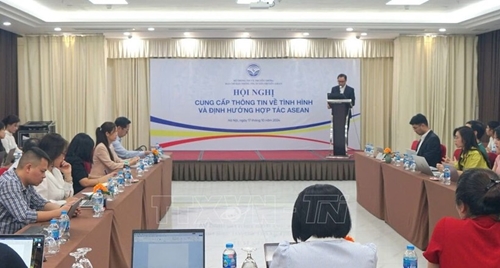According to Director of the Ministry of Foreign Affairs’ ASEAN Department Tran Duc Binh, the ASEAN Laos Chairmanship Year 2024 laid out priorities on enhancing the bloc’s connectivity and resilience, including the promotion of integration and economic linkage, the building of a comprehensive and sustainable future, the maintenance of ASEAN’s center role, and the promotion of cooperation in environment, women-children and health care.
    |
 |
|
At the training course held in Hanoi on October 17 |
The 44th and 45 Summits established the goal of building the ASEAN Community with solidarity, unity, strategic autonomy, a central role, and strategic balance in foreign relations, he said, adding a total of 91 documents were adopted at the events.
ASEAN leaders reaffirmed their commitments to supporting Timor-Leste in its road-map to become a full member of the bloc as well as enhancing its capacity to complete procedures for its participation in legal documents.
Regarding the situation in Myanmar, they expressed their concerns at the ongoing instability and violence as well as the increase in the number of cross-border crimes that could affect the region’s security. Reviewing the implementation of the Five-Point Consensus (5PC), they demanded an end to violence and attacks against civilians and public infrastructure, agreed to continue engagement with competent parties to build trust, and promote comprehensive dialogues towards a peaceful and sustainable solution, while maintaining the Troika mechanism to handle the Myanmar issue and enhancing humanitarian support for the nation.
Touching on the external relations of the bloc, Binh said partners affirmed ASEAN has been a priority in the policies in the region and voiced support for the bloc’s central role, adding they will join hands with ASEAN to carry out comprehensive cooperation, step up connectivity in economy, trade and investment, science, technology, innovation, digital transformation and green transition, improve resilience, and bolster education and vocational training collaboration for high-quality human resources development.
Highlighting regional and global issues of the nations’ concerns, comprising fierce competition between powers, conflicts in various areas, and non-traditional challenges, Binh said they respect international law, the U.N. Charter and multilateralism, preventing hegemony and the use of force and coercion, while calling on powers to manage their relationships, peacefully resolve differences, contribute to peace, and handle common challenges.
Regarding the East Sea (South China Sea) issues, ASEAN leaders underscored the significance of maintaining peace, stability, security, safety, and freedom of navigation and overflight in the waters.
They called for restraint, non-use of force, and settlement of disputes via peaceful means in accordance with international law and the United Nations Convention on the Law of the Sea (UNCLOS). Besides, they called for the full and effective implementation of the Declaration on the Conduct of Parties in the East Sea (DOC) and said they hope that a substantive Code of Conduct in the waters (COC) that aligns with international law and UNCLOS will be finalized soon.
As the ASEAN Chair in 2025, Malaysia will prioritize consolidating and enhancing intrabloc cohesion, promoting integration and connectivity of the ASEAN economies, and strengthening trade and investment, among others, he added.
At the event, representatives from the Ministries of Industry and Trade and Labor, Invalids and Social Affairs also delivered reports on the ASEAN Economic Community post-2025, opportunities and prospects from the ASEAN Digital Economy Framework Agreement, and the bloc’s efforts in establishing support measures for migrant workers.
Source: VNA